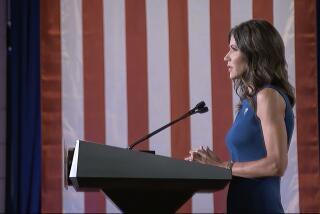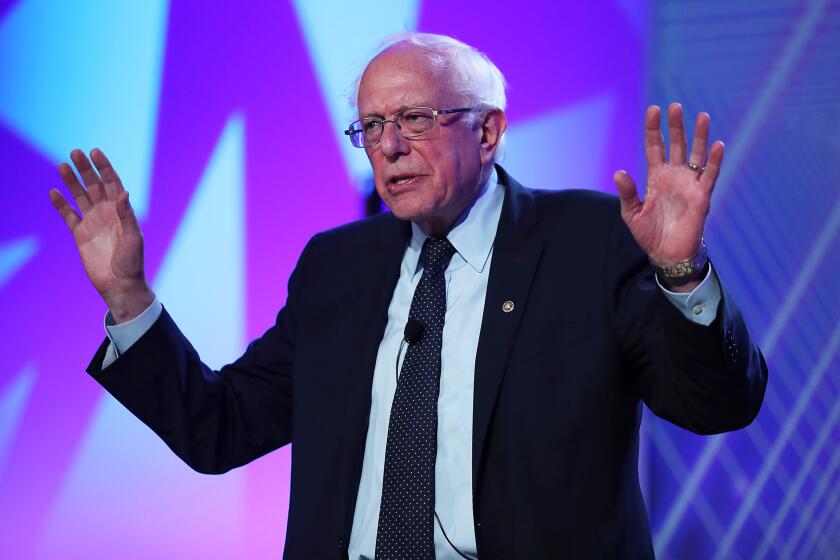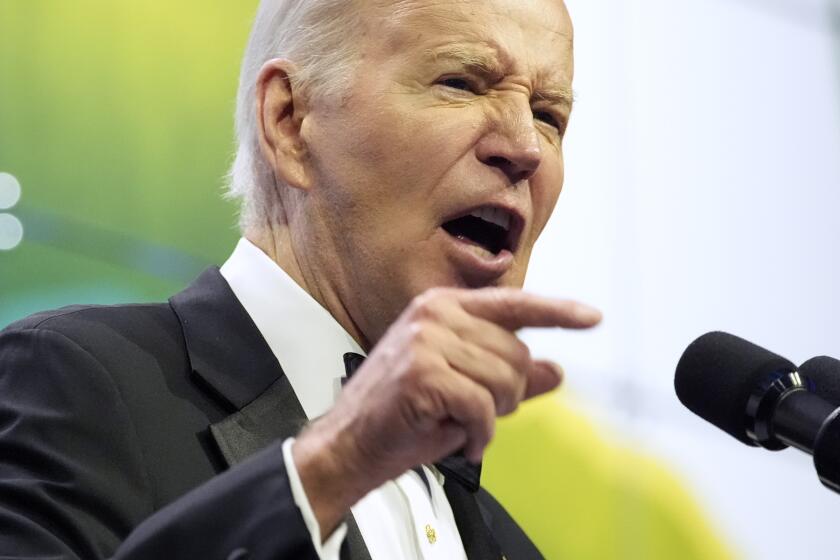U.S. Talib Is Charged With Conspiracy
The Justice Department said Tuesday that it has charged the American Taliban prisoner captured in Afghanistan with conspiracy to kill U.S. citizens and providing aid to terrorists. If convicted, he faces life in prison.
Atty. Gen. John Ashcroft decided--for now--not to charge John Walker Lindh with treason--which would carry a possible death sentence. Debate over how to charge Lindh has reverberated through the Bush administration and across radio call-in shows nationwide.
But Ashcroft held out the possibility that Lindh, 20, could still face treason charges, and he rejected assertions from Lindh’s family and supporters who portrayed him as a misguided youth who was tragically brainwashed by Taliban forces in Afghanistan.
“Youth is not absolution for treachery, and personal self-discovery is not an excuse to take up arms against one’s country,” Ashcroft said at a news conference. “Misdirected Americans cannot seek direction in murderous ideologies and expect to avoid the consequences.”
In a statement issued after the government’s announcement, a lawyer hired by Lindh’s family noted that Lindh had not been given access to legal counsel. Still, attorney George C. Harris said, “We are going to do everything in our power to make sure that John has a fair trial.”
Under a criminal complaint filed Tuesday, Lindh faces charges of conspiracy to kill U.S. citizens overseas--specifically soldiers in the war in Afghanistan; providing material support to separate foreign terrorist groups; and engaging in prohibited transactions with the Taliban. The conspiracy charge carries a possible life sentence.
Lindh--who in the past has used his mother’s maiden name, Walker--which is the name used in court documents--is to be transported to Virginia to stand trial. The complaint, filed in U.S. District Court in Virginia, suggests that much of the evidence against him comes from his own words. Lindh voluntarily provided new and extensive details of his service with the Taliban in two days of FBI interviews last month after he and fellow Taliban soldiers surrendered to Northern Alliance forces in Afghanistan, authorities said.
Lindh’s own statements make clear, Ashcroft said, that the young man made conscious, repeated decisions to fight with and support the Taliban and Al Qaeda leader Osama bin Laden after he ventured off from California to Pakistan in late 2000 to study Islam.
Lindh told investigators that, while training at an Al Qaeda terrorist camp in Afghanistan last year, he met with Bin Laden, who “thanked him for taking part in jihad” against Americans around the world, Ashcroft said. Once his training was completed, he requested to “go to the front lines to fight” with the Taliban, according to the charges.
Even after he learned of Al Qaeda’s role in the Sept. 11 attacks, Lindh--armed with an AKM rifle--allegedly remained with his Taliban fighting group in an unsuccessful effort to maintain their position in Takhar against Northern Alliance attacks.
He and fellow Taliban soldiers ultimately surrendered to Northern Alliance forces, and Lindh--identifying himself as a Pakistani--was questioned around Nov. 25 by CIA agent Johnny M. Spann, who was subsequently killed in a violent uprising by the imprisoned Taliban.
Television footage of Lindh--wounded, disheveled and imprisoned with his fellow Taliban soldiers--riveted Americans and set off vigorous debate about his future.
What could have triggered a shy, bookish youth from the Bay Area--once enthralled by hip-hop music before he discovered Islam at a mosque near his home--to take up arms against his country? And what should be done with him now?
Lindh’s fate has provoked fierce debate on radio call-in shows and galvanized public opinion, with various polls showing as many as 59% saying he should be tried for treason and face the death sentence.
Some officials within the White House reportedly favored treason charges against Lindh, but Ashcroft noted Tuesday that such a charge carries a “high evidentiary burden.” The Constitution requires either a confession in open court or the testimony of at least two witnesses to an “overt” act of treason in order to prove the capital offense.
The treason charge in Lindh’s case would probably have required corroborating testimony from either fellow Taliban soldiers or from U.S. soldiers who witnessed his conduct, said a Justice Department official familiar with Ashcroft’s deliberations.
“Either way, that particular burden would require some work that hasn’t been done yet,” the official said. “I don’t think it was really a close call.”
Ashcroft, asked if he foresaw bringing future treason charges against Lindh, said that ‘if additional evidence is developed that would provide a basis for other charges . . . then we would be free to bring other charges against him.”
Ashcroft said Lindh became a willing, even eager participant in a terrorism enterprise, embracing the Taliban’s anti-American cause and training in weapons, explosives and battlefield combat during his weeks in two separate camps.
“John Walker chose to fight with the Taliban, chose to train with Al Qaeda and to be led by Osama bin Laden,” Ashcroft said. “We may never know why he turned his back on his country . . . but we cannot ignore that he did.”
Lindh has been held in military custody aboard a U.S. Navy ship in the Arabian Sea. Although authorities would not disclose his whereabouts Tuesday, they said he is being transferred to FBI custody. No date has been set for his arraignment.
Lindh is to be tried in a civilian federal court in Alexandria, Va.--a departure from President Bush’s plan to try terrorists and their supporters in military tribunals.
In November, Bush issued a directive allowing the government to use the special military courts to try suspected terrorists who are not U.S. citizens and are captured in the United States or overseas. But the plan was roundly criticized for being too broad in scope, and the administration has now opted against using military tribunals for two high-profile defendants--Zacarias Moussaoui, suspected of being the thwarted “20th hijacker,” and Lindh. Some argued that he effectively renounced his citizenship by joining the Taliban.
Bush “is supportive of the process put in place. He is confident that the process will end in justice,” White House Press Secretary Ari Fleischer said Tuesday after the charges were announced.
Sen. Patrick J. Leahy (D-Vt.), chairman of the Senate Judiciary Committee, also praised Ashcroft’s handling of what he called a “difficult and complex” case. “Like every American, I was appalled that someone from our country would join and fight with an organization as repulsive and repressive as the Taliban.” He urged Lindh to cooperate further with the FBI.
But some civil liberties and defense litigation groups challenged the charges against Lindh and said the administration may have a tough time proving them in court.
Elisa Massimino, Washington director for the Lawyers Committee for Human Rights, said a good defense would be to challenge whether Lindh gave his statements to the FBI voluntarily, as authorities maintained Tuesday.
Ashcroft said Lindh, when questioned by the FBI aboard a military ship, was read his Miranda rights, waived his right to an attorney both orally and in a signed document and spoke freely with investigators.
But Massimino said: “Here you’ve got a guy who is being held on a military ship by hundreds of personnel who view him as the enemy. It’s difficult to imagine that a waiver to a right to counsel in that situation was really voluntary. . . . That will be a primary focus at his trial.”
Other legal experts said it would be difficult for Lindh’s lawyers to convince a court to exclude his statements to the FBI on the grounds that they were made involuntarily.
“It is very rare that defendants get confessions thrown out as involuntary,” said Loyola Law School professor Laurie Levenson, a former federal prosecutor.
“No court will be eager to throw out the evidence against Walker,” Levenson added. On the other hand, she said, if the defense lawyers develop evidence that Walker was tortured or under the influence of drugs, they might be able to mount a good argument for excluding the damaging statements.
Defense lawyer Mark Geragos, who represented Whitewater figure Susan McDougal, agreed that it would be a “very tough challenge” to get the statements thrown out, but said Lindh’s lawyers have to try.
“I would imagine that would be one of the keys to the case,” since Lindh’s “own statements could be the most devastating evidence against him,” Geragos said.
Both Geragos and Levenson said it was noteworthy that the government is not seeking the death penalty against Lindh.
“Strategically that was a good move by the government,” Levenson said. “Although the jurors will still look at the evidence closely, it takes away the sympathy factor” that could be invoked by Lindh’s lawyers if their client faced death if convicted.
*
Times staff writer Henry Weinstein in Los Angeles and James Gerstenzang in Washington contributed to this report.
The U.S. government’s criminal complaint against John Walker Lindh is available on The Times’ Web site. Go to latimes.com/lindh
More to Read
Get the L.A. Times Politics newsletter
Deeply reported insights into legislation, politics and policy from Sacramento, Washington and beyond. In your inbox three times per week.
You may occasionally receive promotional content from the Los Angeles Times.






